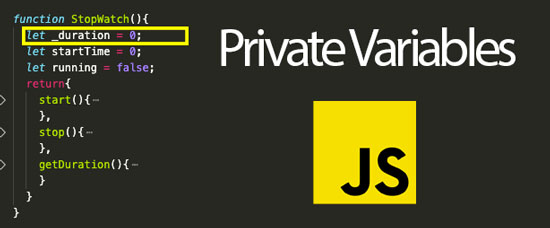
As compared to other languages there is no Private keyword that can be used to declare private variables when creating object and classes in JS. Thats where closures come in to help. We use the property of closures to keep the scope of variables closed inside the function. In JS its a general rule to put an underscore in front of private variable.
Here’s an example of Stopwatch implemented using factory function method:
function StopWatch(){
let _duration = 0;
let startTime = 0;
let running = false;
return{
start(){
console.log('Starting...');
startTime = Date.now();
running = true;
},
stop(){
if(running){
console.log('Stopping...');
_duration += (Date.now() - startTime)/1000;
running = false;
}
},
getDuration(){
return _duration;
}
}
}
let s1 = new StopWatch();
console.log(s1.start())The scope of _duration in the above function is only available to the returning object. If we try to access it with s1._duration it returns undefined which is exactly what we expect from a private variable. We are accessing it via the function getDuration().
In ES6 does not have a proper way to create private as its still just a syntactic sugar around the old methods of creating objects. So we can make use of IIFE(Immediately Invoked Function Expression) way to create a closure and keep the private variables. If we try to access the property duration it will be undefined but it can be accessed using our method getDuration().
Here’s an ES6 implementation:
let StopWatch = (function(){
let _duration = 0;
class StopWatch{
constructor(){
this.startTime = 0;
this.running = false;
}
start(){
console.log('Starting...');
this.startTime = Date.now();
this.running = true;
}
stop(){
if(this.running){
console.log('Stopping...');
_duration += (Date.now() - this.startTime)/1000;
this.running = false;
}
}
getDuration(){
return _duration
}
}
return StopWatch
})();
let s1 = new StopWatch();
console.log(s1.start())Another way of doing is using Weakmap outside the class and use it to keep the private variable which is garbage collected after the function finishes executing.